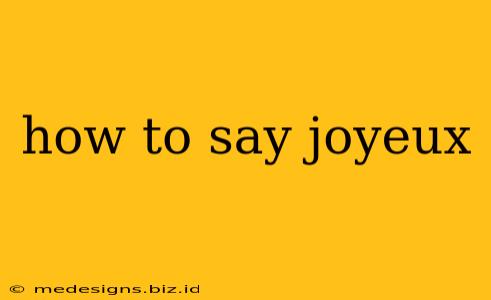How to Say "Joyeux" and More: Mastering French Greetings and Expressions
So, you want to know how to say "joyeux" in French? It's a great starting point for expanding your French vocabulary! "Joyeux" itself means "joyful" or "happy," but it's often part of a larger phrase. Let's dive into how to use it correctly and explore other related expressions.
Understanding "Joyeux" in Context
"Joyeux" isn't typically used on its own like the English word "happy." Instead, it acts as an adjective modifying a noun. Think of it as an adjective that adds a sense of joy or happiness to the thing it describes.
Here's how it works in common phrases:
- Joyeux Noël: Merry Christmas! (Literally: Joyful Christmas)
- Joyeuse Pâques: Happy Easter! (Literally: Joyful Easter)
- Joyeux anniversaire: Happy Birthday! (Literally: Joyful Anniversary - referring to the anniversary of your birth)
- Joyeuse fête: Happy holiday! (A more general happy holiday greeting)
- Joyeux Halloween: Happy Halloween! (A more recent adoption but widely understood)
Notice the agreement with gender and number. "Joyeux" becomes "joyeuse" for feminine nouns (like Pâques and fête) and adds an "s" for plural nouns.
Beyond "Joyeux": Expressing Happiness in French
While "joyeux" is a great word, there are many other ways to express happiness and joy in French. This will make your French sound more natural and nuanced.
Here are some alternatives and variations:
- Heureux/Heureuse: This translates to "happy" and is a more general term for feeling happiness. It can be used in more contexts than "joyeux." Like "joyeux," it changes form depending on the gender and number of the noun it modifies. For example, "Je suis heureuse" means "I am happy."
- Content(e): This means "content" or "satisfied." It expresses a more peaceful and calm kind of happiness.
- Gai/Gaie: This conveys a cheerful and lively happiness. Think of it as "merry" or "bright."
- Enjoué(e): This suggests a playful and lively happiness.
Example Sentences:
- "J'étais très heureux de vous voir." (I was very happy to see you.)
- "Elle est toujours gaie et pleine de vie." (She is always cheerful and full of life.)
- "Je suis contente de mon nouveau travail." (I am content with my new job.)
Mastering French Greetings: A Key to Fluency
Learning how to use "joyeux" and other expressions of happiness is a crucial step towards mastering French. It allows you to participate fully in celebrations and express genuine emotion.
Remember to practice using these phrases in different contexts. The more you use them, the more natural your French will sound. Bonne chance! (Good luck!)
